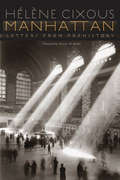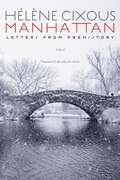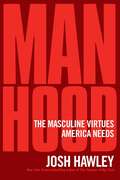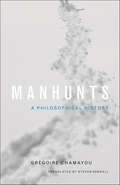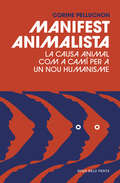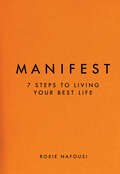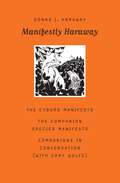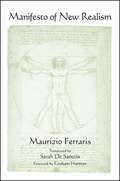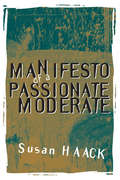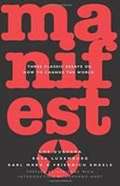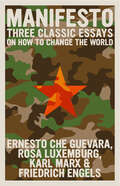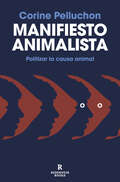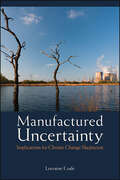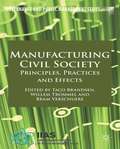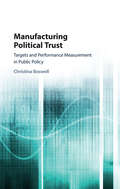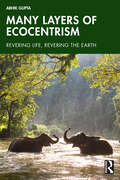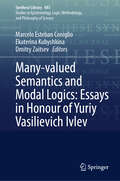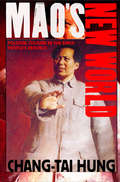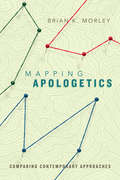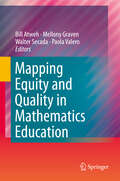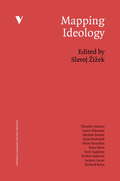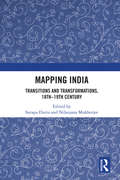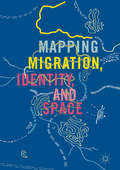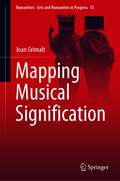- Table View
- List View
Manhattan: Letters from Prehistory
by Hélène Cixous Beverley Bie BrahicManhattan is the tale of a young French scholar who travels to the United States in 1965 on a Fulbright Fellowship to consult the manuscripts of beloved authors. In Yale University’s Beinecke Library, tantalized by the conversational and epistolary brilliance of a fellow researcher, she is lured into a picaresque and tragic adventure. Meanwhile, back in France, her children and no-nonsense mother await her return. A young European intellectual’s first contact with America and the city of New York are the background of this story. The experience of Manhattan haunts this labyrinth of a book as, over a period of thirty-five years, its narrator visits and revisits Central Park and a half-buried squirrel, the Statue of Liberty and a never again to be found hotel in the vicinity of Morningside Heights: a journey into memory in which everything is never the same. Traveling from library to library, France to the United States, Shakespeare to Kafka to Joyce, Manhattan deploys with gusto all the techniques for which Cixous’s fiction and essays are known: rapid juxtapositions of time and place, narrative and description, analysis and philosophical reflection. It investigates subjects Cixous has spent her life probing: reading, writing, and the “omnipotence-other” seductions of literature; a family’s flight from Nazi Germany and postcolonial Algeria; childhood, motherhood, and, not least, the strange experience of falling in love with, as Jacques Derrida writes, “a counterfeit genius.”
Manhattan: Letters from Prehistory
by Hélène CixousManhattan is the tale of a young French scholar who travels to the United States in 1965 on a Fulbright Fellowship to consult the manuscripts of beloved authors. In Yale University’s Beinecke Library, tantalized by the conversational and epistolary brilliance of a fellow researcher, she is lured into a picaresque and tragic adventure. Meanwhile, back in France, her children and no-nonsense mother await her return. A young European intellectual’s first contact with America and the city of New York are the background of this story. The experience of Manhattan haunts this labyrinth of a book as, over a period of thirty-five years, its narrator visits and revisits Central Park and a half-buried squirrel, the Statue of Liberty and a never again to be found hotel in the vicinity of Morningside Heights: a journey into memory in which everything is never the same. Traveling from library to library, France to the United States, Shakespeare to Kafka to Joyce, Manhattan deploys with gusto all the techniques for which Cixous’s fiction and essays are known: rapid juxtapositions of time and place, narrative and description, analysis and philosophical reflection. It investigates subjects Cixous has spent her life probing: reading, writing, and the “omnipotence-other” seductions of literature; a family’s flight from Nazi Germany and postcolonial Algeria; childhood, motherhood, and, not least, the strange experience of falling in love with a counterfeit genius.
Manhood: The Masculine Virtues America Needs
by Josh HawleyNationally best-selling author (The Tyranny of Big Tech), constitutional lawyer, and U.S. senator for the state of Missouri argues that the character of men and the male virtue that goes along with it is a necessary ingredient to a functioning society and a healthy, free republic.A free society that despises manhood will not remain free. The American Founders believed that a republic depends on certain masculine virtues. Senator Josh Hawley thinks they were right. In a bold new book, he calls on American men to stand up and embrace their God-given responsibility as husbands, fathers, and citizens. No republic has ever survived without men of character to defend what is just and true. Starting with the wisdom of the ancients, from the Greek and Roman philosophers to Jesus of Nazareth, and drawing on the lessons of American history, Hawley identifies the defining strengths of men, including responsibility, bravery, fidelity, and leadership. As Theodore Roosevelt declared, the &“very existence of the state depends on the character of its citizens…. I am for business. But I am for manhood first.&” Hawley shows why the foolhardy assault on masculinity in education, the media, the workplace, and every level of government is an assault on freedom itself. Practical, down to earth, and urgent, Manhood: The Masculine Virtues America Needs is required reading for every American patriot.
Manhunts: A Philosophical History
by Grégoire ChamayouA comprehensive history of manhunting in the West, from ancient times to the presentTouching on issues of power, authority, and domination, Manhunts takes an in-depth look at the hunting of humans in the West, from ancient Sparta, through the Middle Ages, to the modern practices of chasing undocumented migrants. Incorporating historical events and philosophical reflection, Grégoire Chamayou examines the systematic and organized search for individuals and small groups on the run because they have defied authority, committed crimes, seemed dangerous simply for existing, or been categorized as subhuman or dispensable.Chamayou begins in ancient Greece, where young Spartans hunted and killed Helots (Sparta's serfs) as an initiation rite, and where Aristotle and other philosophers helped to justify raids to capture and enslave foreigners by creating the concept of natural slaves. He discusses the hunt for heretics in the Middle Ages; New World natives in the early modern period; vagrants, Jews, criminals, and runaway slaves in other eras; and illegal immigrants today. Exploring evolving ideas about the human and the subhuman, what we owe to enemies and people on the margins of society, and the supposed legitimacy of domination, Chamayou shows that the hunting of humans should not be treated ahistorically, and that manhunting has varied as widely in its justifications and aims as in its practices. He investigates the psychology of manhunting, noting that many people, from bounty hunters to Balzac, have written about the thrill of hunting when the prey is equally intelligent and cunning.An unconventional history on an unconventional subject, Manhunts is an in-depth consideration of the dynamics of an age-old form of violence.
Manifest animalista: La causa animal com a camí per a un nou humanisme
by Corine PelluchonLa violència contra els animals és un atac directe a la nostra humanitat. Això demostra Corine Pelluchon en aquest breu, pragmàtic, i controvertit assaig que suposa una contribució radical a l'ètica i la filosofia política. Lluitar contra el maltractament animal és rebel·lar-se contra una societat basada en l'explotació, i per això la causa animalista és una qüestió política major que ens concerneix a tots, més enllà d'ideologies o conflictes d'interessos. Amb un estil viu, persuasiu i inspirador, l'autora proposa un camí possible i factible per portar aquest debat a l'esfera política amb tanta claredat i urgència com sigui possible. Ressenyes:«Corine Pelluchon ho explica tot absolutament bé en tot just un centenar de pàgines: per ser una alternativa vàlida, és imprescindible polititzar la causa animal.»Luce Lapin, Charlie Hebdo «L'objectiu principal de l'autora està completament assolit en aquest Manifest animalista: dóna al lector les claus que li permetran ampliar el radi d'acció de l'humanisme als animals.»Philippe Douroux, Libération «Una perspectiva bella i ambiciosa.»Isabelle Gravillon, Femme Majuscule «Un llibre d'intervenció política, tan compromès com lúcid.»Robert Jules, La Tribune «Una de les moltes i grans qualitats d'aquest Manifest animalista és que, en tot moment, el seu projecte està exposat de manera perfectament creïble i realitzable. Precisament per això, l'autora no es fa cap il·lusió sobre la dificultat que suposa introduir la qüestió animal en el debat polític.»Hicham-Stéphane Afeissa, Non Fiction
Manifest: 7 Steps to Living Your Best Life
by Roxie NafousiTHE INSTANT INTERNATIONAL BESTSELLER Change your life with the first truly practical guide to manifesting, the hugely popular self-development practice that will transform your life for good . . . Written by self-development coach and 'Queen of Manifesting' Roxie Nafousi, this book is the essential guide to anyone and everyone wanting to feel more empowered in their lives. In just seven simple steps you can understand the true art of manifestation and create the life you have always dreamed of. Whether you want to attract your soulmate, land the perfect job, buy the home you have always wanted, or simply find more inner-peace and confidence, Manifest will teach you exactly how to get there . . . 1. Be clear in your vision2. Remove fear and doubt3. Align your behavior4. Overcome tests from the universe5. Embrace gratitude without caveats6. Turn envy into inspiration7. Trust in the universe A meeting of science and wisdom, manifesting is a philosophy and a self-development practice to help you reach for your goals, cultivate self-love and live your best life. Unlock the magic for yourself and begin your journey to turning your dreams into reality.
Manifestly Haraway (Posthumanities #37)
by Donna J. HarawayElectrifying, provocative, and controversial when first published thirty years ago, Donna Haraway&’s &“Cyborg Manifesto&” is even more relevant today, when the divisions that she so eloquently challenges—of human and machine but also of gender, class, race, ethnicity, sexuality, and location—are increasingly complex. The subsequent &“Companion Species Manifesto,&” which further questions the human–nonhuman disjunction, is no less urgently needed in our time of environmental crisis and profound polarization.Manifestly Haraway brings together these momentous manifestos to expose the continuity and ramifying force of Haraway&’s thought, whose significance emerges with engaging immediacy in a sustained conversation between the author and her long-term friend and colleague Cary Wolfe. Reading cyborgs and companion species through and with each other, Haraway and Wolfe join in a wide-ranging exchange on the history and meaning of the manifestos in the context of biopolitics, feminism, Marxism, human–nonhuman relationships, making kin, literary tropes, material semiotics, the negative way of knowing, secular Catholicism, and more.The conversation ends by revealing the early stages of Haraway&’s &“Chthulucene Manifesto,&” in tension with the teleologies of the doleful Anthropocene and the exterminationist Capitalocene. Deeply dedicated to a diverse and robust earthly flourishing, Manifestly Haraway promises to reignite needed discussion in and out of the academy about biologies, technologies, histories, and still possible futures.
Manifesto of New Realism (SUNY series in Contemporary Italian Philosophy)
by Maurizio FerrarisPhilosophical realism has taken a number of different forms, each applied to different topics and set against different forms of idealism and subjectivism. Maurizio Ferraris's Manifesto of New Realism takes aim at postmodernism and hermeneutics, arguing against their emphasis on reality as constructed and interpreted. While acknowledging the value of these criticisms of traditional, dogmatic realism, Ferraris insists that the insights of postmodernism have reached a dead end. Calling for the discipline to turn its focus back to truth and the external world, Ferraris's manifesto—which sparked lively debate in Italy and beyond—offers a wiser realism with social and political relevance.
Manifesto of a Passionate Moderate: Unfashionable Essays
by Susan HaackForthright and wryly humorous, philosopher Susan Haack deploys her penetrating analytic skills on some of the most highly charged cultural and social debates of recent years. Relativism, multiculturalism, feminism, affirmative action, pragmatisms old and new, science, literature, the future of the academy and of philosophy itself—all come under her keen scrutiny in Manifesto of a Passionate Moderate. "The virtue of Haack's book, and I mean virtue in the ethical sense, is that it embodies the attitude that it exalts. . . Haack's voice is urbane, sensible, passionate—the voice of philosophy that matters. How good to hear it again."—Jonathan Rauch, Reason "A tough mind, confident of its power, making an art of logic . . . a cool mastery."—Paul R. Gross, Wilson Quarterly "Few people are better able to defend the notion of truth, and in strong, clear prose, than Susan Haack . . . a philosopher of great distinction."—Hugh Lloyd-Jones, National Review "If you relish acute observation and straight talk, this is a book to read."—Key Reporter (Phi Beta Kappa) "Everywhere in this book there is the refreshing breeze of common sense, patiently but inexorably blowing."—Roger Kimball, Times Literary Supplement "A refreshing alternative to the extremism that characterizes so much rhetoric today."—Kirkus Reviews
Manifesto: Three Classic Essays on How to Change the World
by Friedrich Engels Karl Marx Ernesto Che Guevara Rosa Luxemburg"Let's be realists, let's dream the impossible." Che Guevara's words summarize the radical vision of the four famous rebels presented in this book: Marx and Engels' "Communist Manifesto," Rosa Luxemburg's "Reform or Revolution" and Che Guevara's "Socialism and Humanity." Far from being lifeless historical documents, these manifestos for revolution will resonate with a new generation also seeking a better world. "The world described by Marx and Engels... is recognizably the world we live in 150 years later.
Manifesto: Three Classic Essays on How to Change the World (The Che Guevara Library)
by Friedrich Engels Karl Marx Ernesto Che Guevara Rosa LuxemburgThe three texts this book, all written in vastly different eras —The Communist Manifesto (1848) by Marx and Engels, Reform or Revolution (1899) by Rosa Luxemburg and Socialism and Man in Cuba (1965) by Ernesto Che Guevara—illuminate socialist ideas of the 19th and 20th centuries.For a new generation of activists, these are classic revolutionary writings by four famous rebels, including The Communist Manifesto by Karl Marx and Friedrich Engels; Reform or Revolution by Rosa Luxemburg; and Che Guevara&’s Socialism and Man in Cuba. Includes an introduction by Cuban Marxist intellectual Armando Hart and a preface by US radical poet Adrienne Rich. The essays in this book, Manifesto, were written by three relatively young people—Karl Marx when he was 30, Rosa Luxemburg at 27, Che Guevara at the age of 37. Born into different historical moments and different generations, they shared an energy of hope, an engagement with history, a belief that critical thinking must inform action, and a passion for the world and its human possibilities. Here are urgent conversations from the past that are still being carried on, among new voices, throughout the world.
Manifiesto animalista
by Corine PelluchonLa violencia contra los animales es un ataque directo a nuestra humanidad. Eso demuestra Corine Pelluchon en este breve ensayo, pragmático, controvertido y que supone una contribución radical a la ética y la filosofía política. <P><P>Luchar contra el maltrato animal es rebelarse contra una sociedad basada en la explotación, y por ello la causa animalista es una cuestión política mayor que nos concierne a todos, más allá de ideologías o conflictos de intereses. <P>Con un estilo vivo, persuasivo e inspirador, la autora propone un camino posible y factible para llevar el debate a la esfera política con tanta claridad y urgencia como sea posible.
Manifiesto animalista: Politizar la causa animal
by Corine PelluchonLa violencia contra los animales es un ataque directo a nuestra humanidad. Eso demuestra Corine Pelluchon en este breve ensayo, pragmático, controvertido y que supone una contribución radical a la ética y la filosofía política. «Un libro intenso, pese a su brevedad, de acción, llamado a marcar época. [...] Una propuesta clara y concisa para avanzar de manera decisiva en nuestra relación con los animales».Jacinto Antón, El País Luchar contra el maltrato animal es rebelarse contra una sociedad basada en la explotación, y por ello la causa animalista es una cuestión política mayor que nos concierne a todos, más allá de ideologías o conflictos de intereses. Con un estilo vivo, persuasivo e inspirador, la autora propone un camino posible y factible para llevar el debate a la esfera política con tanta claridad y urgencia como sea posible. Reseñas:«No exento de polémica, Manifiesto animalista, no pretende aleccionar moralmente a nadie, ni siquiera pretende convertirnos en animalistas, sino poner al lector, ciudadano, al fin y al cabo, en la meta de salida de un proceso de auto conversión e introspección. [...] Un cambio a varios niveles y que venga desde diferentes ámbitos: una nueva era, la de los seres vivientes, que deje atrás el antropocentrismo y que ponga el acento en nuestra manera de habitar la tierra».Queralt Castillo Cerezuela, Público«Un texto corto, directo y con propuestas muy concretas. Un panfleto que rompe la brecha entre la teoría y la práctica y va encaminado hacia la acción. Y en su país han recogido el guante. [...] La mejor muestra de que la lucha por los derechos de los animales ha traspasado ya la linde del mero activismo».Paula Corroto, El País «El ensayo dela doctora en filosofía Pelluchon irrumpe en la sociedad del siglo XXI como una verdadera catarsis del espíritu».LA.Network «Un nuevo paradigma del movimiento animalista mundial. [...] Un libro intenso, pese a su brevedad, de acción, llamado a marcar época y que constituye a la vez un estado de la cuestión, una declaración de intenciones y una propuesta clara y concisa para avanzar de manera decisiva en nuestra relación con los animales».Jacinto Antón, El País «La voz del animalismo».Núria Navarro, El Periódico«Un nombre de referencia del antiespecismo que busca convencer, no vencer a cualquier precio. [...] Manifiesto animalista resuena más necesaria que nunca.»Igor López, ICON «Corine Pelluchon lo explica todo absolutamente bien en apenas un centenar de páginas: para ser una alternativa válida, politizar la causa animal es imprescindible.»Luce Lapin, Charlie Hebdo«El objetivo principal de la autora está completamente logrado en este Manifiesto animalista: le da al lector las claves que le permitirán ampliar el radio de acción del humanismo a los animales.»Philippe Douroux, Libération «Una perspectiva bella y ambiciosa.»Isabelle Gravillon, Femme Majuscule«Un libro de intervención política, tan comprometido como lúcido.»Robert Jules, La Tribune «Una de las muchas y grandes cualidades de este Manifiesto animalista es que, en todo momento, su proyecto está expuesto de manera perfectamente creíble y realizable. Precisamente por eso, la autora no se hace ninguna ilusión sobrela dificultad que supone introducir la cuestión animal en el debate político.»Hicham-Stéphane Afeissa, Non Fiction
Manufactured Uncertainty: Implications for Climate Change Skepticism
by Lorraine CodeIn this provocative work, Lorraine Code returns to the idea of "epistemic responsibility," as developed in her influential 1987 book of the same name, to confront the telling new challenges we now face to know the world with some sense of responsibility to other "knowers" and to the sustaining, nonhuman world. Manufactured Uncertainty focuses centrally on the environmental and cultural crises arising from postindustrial, man-made climate change, which have spawned new forms of passionately partisan social media that directly challenge all efforts to know with a sense of collective responsibility. How can we agree to act together, Code asks, even in the face of inevitable uncertainty, given the truly life-threatening stakes of today's social and political challenges? How can we engage responsibly with those who take every argument for an environmentally grounded epistemology as an unacceptable challenge to their assumed freedoms, comforts, and "rights?" Through searching critical dialogue with leading epistemologists, cultural theorists, and feminist scholars, this book poses a timely challenge to all thoughtful knowers who seek to articulate an expanded and deepened sense of epistemic responsibility—to a human society and a natural world embraced, together, in the most inclusive spirit.
Manufacturing Civil Society
by Taco Brandsen Willem Trommel Bram VerschuereFaced with falling social cohesion governments have sought to revitalise society by trying to reconstruct local communities, civil society and citizenship. As a result, civil society is increasingly brought within the realm of public management, subject to accountability and embedded in hierarchies the impact and origins of which this book explores
Manufacturing Political Trust: Targets and Performance Management in Public Policy
by Christina BoswellMeasurement and targets have been widely criticised as distorting policy and engendering gaming - yet they continue to be widely used in government. This book offers an original new account explaining the persistent appeal of performance measurement. It argues that targets have been adopted to address a crisis of trust in politics, through creating more robust mechanisms of accountability and monitoring. The book shows that such tools rarely have their intended effect. Through an in-depth analysis of UK targets on immigration and asylum since 2000, it shows that far from shoring up trust, targets have engendered cynicism and distrust in government. Moreover, they have encouraged intrusive forms of monitoring and reform in public administration, with damaging consequences for trust between politicians and civil servants. Despite these problems, performance measurement has now become embedded in techniques of public management. It has also become normalised as a way of framing policy problems and responses. Thus despite their acknowledged problems, targets are likely to retain their allure as techniques of political communication and governance. Employs a range of theoretical approaches from across the social and political sciences to examine the use of performance targets in public policy; Focuses on the highly topical subject of political trust, and how governments attempt to address voter mistrust in politicians and political institutions; Analyses the highly relevant subject of contemporary UK immigration and asylum to illustrate the pitfalls of using performance measurement targets.
Many Layers of Ecocentrism: Revering Life, Revering the Earth
by Abhik GuptaThis book unveils the myriad streams of ecocentric thoughts that have been flowing through the human mind – in indigenous communities, in the wisdom of philosophers, in the creative expressions of poets and writers – sometimes latent, but sometimes more explicit. The strength of this book lies in the fact that it attempts to show that ecocentrism had not emerged suddenly as a distinct line of philosophical thought or found its place among the various normative approaches toward nature, but the seeds of ecocentrism had always been running through human societies. Thus, this book not only emphasizes the “unity of life” but also reveals the inherent unity of all hues of ecocentrism. The book adopts a multidisciplinary approach, which is essential to dwell on a topic like ecocentrism which permeates the domains of disciplines as disparate as science, philosophy, religion, normative ethics, myths and folklore, poetry, and literature, among others. Despite this eclectic approach, the book attempts to maintain continuity among the chapters and present these concepts in a simple form that will be easily accessible by readers from all conceivable backgrounds. This book would be useful to the students, researchers, and faculty from the fields of ecology and environmental science, philosophy, sociology, religious studies, and literature. It will also be an indispensable companion for all nature lovers, activists, and general readers interested in the emergence and evolution of environmental thoughts.
Many-valued Semantics and Modal Logics: Essays in Honour of Yuriy Vasilievich Ivlev (Synthese Library #485)
by Marcelo Esteban Coniglio Dmitry Zaitsev Ekaterina KubyshkinaThis volume is a collection of essays related to the work of Professor Yuriy Vasilievich Ivlev, a distinguished Russian logician and philosopher renowned for his expertise in many-valued and modal logics. Notably, his groundbreaking work on quasi-matrices for logics, now recognized as non-deterministic matrices and non-deterministic semantics, emerged in the 1970s. From a philosophical standpoint, Ivlev’s research delves into the formal analysis of indeterminacy, offering a logical framework to understand how sequences of indeterminate events can yield determinate outcomes. The volume follows two complementary lines of research. Firstly, it serves as a platform for the exploration and discussion of Ivlev’s seminal contributions to the algebraic characterization of both normal and non-normal modal logics, aimed at making these insights accessible to an international audience. Secondly, it features contributions from esteemed logicians and philosophers worldwide, offering diverseperspectives on the logical analysis of indeterminacy. This comprehensive volume will appeal to scholars and researchers in logic, philosophy, and mathematics who are engaged in the study of many-valued and modal methodologies for modeling situations of indeterminacy.
Mao's New World: Political Culture in the Early People's Republic
by Chang-tai HungIn this sweeping portrait of the political culture of the early People's Republic of China (PRC), Chang-tai Hung mines newly available sources to vividly reconstruct how the Chinese Communist Party (CCP) tightened its rule after taking power in 1949. With political-cultural projects such as reconstructing Tiananmen Square to celebrate the Communist Revolution; staging national parades; rewriting official histories; mounting a visual propaganda campaign, including oil paintings, cartoons, and New Year prints; and establishing a national cemetery for heroes of the Revolution, the CCP built up nationalistic fervor in the people and affirmed its legitimacy. These projects came under strong Soviet influence, but the nationalistic Chinese Communists sought an independent road of nation building; for example, they decided that the reconstructed Tiananmen Square should surpass Red Square in size and significance, against the advice of Soviet experts sent from Moscow.Combining historical, cultural, and anthropological inquiries, Mao's New World examines how Mao Zedong and senior Party leaders transformed the PRC into a propaganda state in the first decade of their rule (1949–1959). Using archival sources only recently made available, previously untapped government documents, visual materials, memoirs, and interviews with surviving participants in the Party's plans, Hung argues that the exploitation of new cultural forms for political ends was one of the most significant achievements of the Chinese Communist Revolution. The book features sixty-six images of architecture, monuments, and artwork to document how the CCP invented the heroic tales of the Communist Revolution.
Mapping Apologetics: Comparing Contemporary Approaches
by Brian K. MorleyEveryone believes something. But how and why do people believe? What counts as evidence? How much can be assumed or believed by faith alone? When it comes to religious faith, the questions become at once more difficult and more important. Over the centuries, Christians have offered different approaches to explaining or defending the Christian faith, a discipline known as apologetics. But it has not always been clear how different apologetic methods work, or what each approach has to offer. In this comprehensive survey, Brian Morley provides an overview of Christian apologetic approaches and how they differ. He explores the historical and philosophical underpinnings of key figures and major schools of thought, from the presuppositionalism of Cornelius Van Til to the evidentialism of Gary Habermas. Moving beyond theory, Morley also covers apologetic application, demonstrating how each view works out in practical terms. This guide covers the complexities of apologetics in a way that is accessible to the nonspecialist. Even-handed and respectful of each apologist and their contribution, this book provides the reader with a formidable array of defenses for the faith.
Mapping Equity and Quality in Mathematics Education
by Paola Valero Mellony Graven Bill Atweh Walter SecadaConcerns about quality mathematics education are often posed in terms of the types of mathematics that are worthwhile and valuable for both the student and society in general, and about how to best support students so that they can develop this mathematics. Concerns about equity are about who is excluded from the opportunity to develop quality mathematics within our current practices and systems, and about how to remove social barriers that systematically disadvantage those students. This collection of chapters summarises our learning about the achievement of both equity and quality agendas in mathematics education and to move forward the debate on their importance for the field.
Mapping Ideology
by Slavoj Zizek Nicholas Abercrombie Louis Althusser Theodor Adorno Michele BarrettFor a long time, the term "ideology" was in disrepute, having become associated with such unfashionable notions as fundamental truth and the eternal verities. The tide has turned, and recent years have seen a revival of interest in the questions that ideology poses to social and cultural theory and to political practice.Including Slavoj i ek's study of the development of the concept from Marx to the present, assessments of the contributions of Lukács and the Frankfurt School by Terry Eagleton, Peter Dews and Seyla Benhabib, and essays by Adorno, Lacan and Althusser, Mapping Ideology is an invaluable guide to the most dynamic field in cultural theory.
Mapping India: Transitions and Transformations, 18th–19th Century
This book presents an alternate history of colonial India in the 18th and the 19th centuries. It traces the transitions and transformations during this period through art, literature, music, theatre, satire, textiles, regime changes, personal histories and migration. The essays in the volume examine historical events and movements which questioned the traditional parameters of identity and forged a new direction for the people and the nation. Viewing the age through diverse disciplinary angles, the book also reflects on the various reimaginings of India at the time. This volume will be of interest to academics and researchers of modern Indian history, cultural studies and literature. It will also appeal to scholars interested in the anthropological, sociological and psychological contexts of imperialism.
Mapping Migration, Identity, and Space
by Timothy H. Parsons Tabea LinhardThis interdisciplinary collection of essays focuses on the ways in which movements of people across natural, political, and cultural boundaries shape identities that are inexorably linked to the geographical space that individuals on the move cross, inhabit, and leave behind. As conflicts over identities and space continue to erupt on a regular basis, this book reads the relationship between migration, identity, and space from a fresh and innovative perspective.
Mapping Musical Signification (Numanities - Arts and Humanities in Progress #15)
by Joan GrimaltThis book is a unique attempt to systematize the latest research on all that music connotes. Musicological reflections on musically expressive content have been pursued for some decades now, in spite of the formalist prejudices that can still hindermusicians and music lovers. The author organizes this body of research so that both professionals and everyday listeners can benefit from it – in plain English, but without giving up the level of depth required by the subject matter. Two criteria have guided his choice among the many ways to speak about musical meaning: its relevance to performance, and its suitability to the teaching context.The legacy of the so-called art music, without an interpretive approach that links ancient traditions to our present, runs the risk of missing the link to the new generations of musicians and listeners. Complementing the theoretical, systematic content, each chapter includes a wealth of examples, including the so-called popular music.
